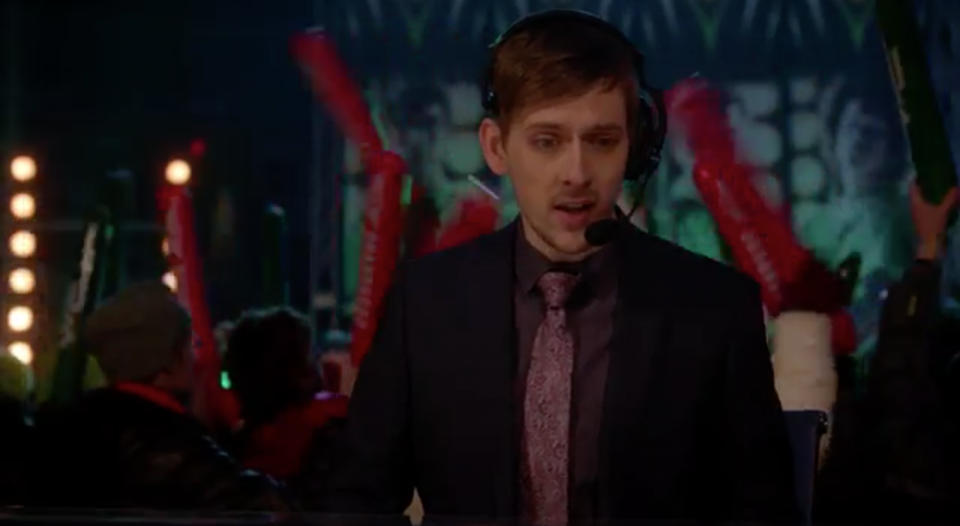CBS drama ‘Bull’ explores esports players’ rights, gets a lot surprisingly right

Primetime TV shows aren’t exactly known for their authentic representations of video game or esports culture. More often than not, their interpretations of the esports world comes down to, “Look at these weirdo kids playing games in their mothers’ basements, isn’t it super wacky that they get paid to play?”
CBS show Bull, a dramedy about the consultants that select jury members for trials, bucked that trend with Tuesday night’s episode, entitled ‘The Fall.’
I won’t pretend the episode was a perfect representation of the esports world. It portrayed Titanfall (the first one) as the biggest game in the world, with 70 million viewers and a $3 million tournament. There was a confusing scene in which it was implied the jury was going to play Titanfall on iPads. Some questionable usage of the word “epic” floated around. No one calls Titanfall “The Fall.” Ever. Anywhere.
But its depiction of the struggle between players and esports team owners may hit a little too close to home for many.
Getting it right
Before I get into some of the bigger esports-relevant themes that ‘The Fall’ speaks to, let’s go into some of the smaller details that they get right.
I’m not going to lie: when I started watching Bull (having never seen the show before), I was expecting them to get everything wrong. I was expecting the appearance of Dota 2 caster Kevin “Purge” Godec to be the most authentic element of the episode.
I was wrong. Someone outside of the casting agent did their research.
The pro players have the right clickity-clackity mechanical keyboards. They live in a team house. Their teams have abbreviated and numerical names like DV8. The best Titanfall player in the world (who goes by Jace) uses a lot of the correct lingo, including one scene where he calls an earpiece in Dr. Jason Bull’s ear a “comm.” Thunder sticks are everywhere in tournament scenes. There’s a player named “YunaYoona,” potentially named after League’s favorite memer. Jace is considered “old” by esports standards, even though he’s only 25.. As a 28-year-old esports writer, that definitely hits a little too close to home.
Hell, they even call out Jace as being someone who practices for “16 hours a day,” forcing his teammates to keep up. Whenever you hear about a truly dedicated esports player, 16 is always the number of hours they point to.
It’s definitely not perfect. Again, no one says “epic” that much. But it’s about as close as a primetime TV show has gotten to capturing esports ever.

#PlayersRights
At its core, ‘The Fall’ is an episode about the conflict between players and owners. The controversy is ripped directly from the headlines of the esports world. Some writer over there has their finger on the pulse of what’s going on within esports.
Sure, it’s dramaticized. The whole controversy starts with Jace failing to make a play, costing his team DV8 the Titanfall world championship. As a result, DV8 owner Vin Creuster tosses him from the team and accuses him of throwing the match, essentially blacklisting the young player from joining any other roster. To add authenticity, they even have Creuster making that particular declaration right outside of an arena to a lone reporter (played by former G4 host Morgan Webb) with a microphone.
Where have we seen this sort of thing before? Oh right, literally everywhere in esports.
Claiming he didn’t throw the game but simply failed to win the match, Jace sues Creuster for damages to his reputation and career. From there, the episode evolves into an (admittedly simplistic) exploration of the relationship between players and team owners.
Much of the court case is focused on the dispute between the best player in the world and the man running the team he used to play for. In one scene, DV8 pays Jace $500,000 a year, but team owner Creuster is making millions. Jace and his teammates are left powerless in the face of blacklists and the reputation-destroying power of their team owner.
Sound familiar? The conflict between players and owners isn’t exactly a new one. It reared its head recently in the fight between Sean “Sgares” Gares and Team SoloMid owner Andy “Reginald” Dinh, but it’s been an issue for years. It’s cool to see it discussed in a mainstream public forum.

Spoiler alert
The episode ends with Jace being diagnosed with Parkinson’s Disease, which interfered with his ability to play the game at the highest level. . Thanks to some post-game analysis, it’s discovered that another of DV8’s players actually threw the game. That player is kicked off the team, Jace starts treatment, and ultimately rejoins his former roster.
The final scene shows Vin Creuster announcing that the Titanfall league has formalized all player contracts, putting team owners and players on equal footing. Obviously, the nitty gritty details are left out (it’s primetime TV, after all), but the implication is that they’ve achieved the parity that real-life esports leagues are aiming for.
Of course, the tidiness of the resolution can only really happen within the confines of an hour-long dramedy. But it is nice that Bull didn’t totally embarrass itself in its depiction of esports. It even managed to explore a fairly complicated topic in a way that implied someone on the writing staff knows their stuff about esports.
Maybe the rest of the world is finally catching on. Or maybe Bull just got lucky.
Taylor Cocke may not be sold on Bull, but he respects the effort they put in here. Follow him on Twitter @taylorcocke.


